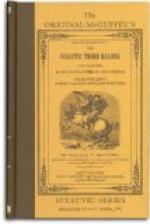6. There was, in the college, a society made up of all the best scholars. Charles was chosen a member of that society. It was the custom to choose some one of the society to deliver a public address every year. This honor was conferred on Charles; and he had studied so diligently, and read so much, that he delivered an address which was very interesting to all who heard it.
7. At last he graduated, as it is called; that is, he finished his collegiate course, and received his degree. It was known by all that he was a good scholar, and by all that he was respected. His father and mother, brothers and sisters, came on the commencement day to hear him speak.
8. They all felt gratified, and loved Charles more than ever. Many situations of usefulness and profit were opened to him; for Charles was now an intelligent man, and universally respected. He is still a useful and a happy man. He has a cheerful home, and is esteemed by all who know him.
9. Such are the rewards of industry. How strange it is that any person should be willing to live in idleness when it will certainly make him unhappy! The idle boy is almost invariably poor and miserable; the industrious boy is happy and prosperous.
10. But perhaps some child who reads this, asks, “Does God notice little children in school?” He certainly does. And if you are not diligent in the improvement of your time, it is one of the surest evidences that your heart is not right with God. You are placed in this world to improve your time. In youth you must be preparing for future usefulness. And if you do not improve the advantages you enjoy, you sin against your Maker.
With books, or work, or healthful play,
Let your first years be passed;
That you may give, for every day,
Some good account, at last.
Definitions.—l. His’to-ry, a description or a narration of events. 2. Con’science, our own knowledge of right and wrong. Game, play, sport. 3. Com-mit’ted, fixed in mind. 4. Rec-om-men-da’tion, what is said in praise of anyone. 5. Re view’, to examine again. Tran’quil, quiet, calm. 6. Con-ferred’, given to or bestowed upon anyone. 7. Grad’u-a-ted, received a degree from a college. Com-mence’ment, the day when students receive their degree. 8. U-ni-ver’sal-ly, by all, without exception. 9. In-va’ri-a-bly, always, uniformly. 10. Ev’i-den-ces, proofs. Ad-van’ta-ges, opportunities for improvement.
Exercises.—What was the character of George Jones? Of Charles Bullard? How did George appear in the class at school? How did he behave at recess? How did Charles differ from him in these respects? Relate what happened when George went to college. What became of him? Did Charles succeed at college? Which of them do you think more worthy of imitation? What is said of the idle? What is said of the industrious? Who watches all our actions wherever we may be? For what are we placed in this world? Should you not then be diligent in your studies?




